
Clinical Endoscopy
Scope & Guideline
Empowering Clinicians with Cutting-Edge Insights
Introduction
Aims and Scopes
- Endoscopic Techniques and Innovations:
The journal emphasizes new methodologies and advancements in endoscopic procedures, including novel instruments, techniques such as endoscopic submucosal dissection, and minimally invasive approaches to gastrointestinal surgery. - Clinical Applications in Gastroenterology:
Research published in the journal covers the practical applications of endoscopic techniques in diagnosing and treating a wide array of gastrointestinal diseases, ranging from cancers to inflammatory conditions. - Integration of Technology and AI in Endoscopy:
There is a consistent focus on the integration of artificial intelligence and advanced imaging technologies in endoscopy, enhancing diagnostic accuracy and procedural outcomes. - Safety and Efficacy of Endoscopic Procedures:
The journal highlights studies that assess the safety, efficacy, and complications associated with various endoscopic interventions, providing valuable insights for clinical practice. - Training and Education in Endoscopy:
The journal also addresses the importance of training and simulation in endoscopic skills development, emphasizing the need for continuous education among practitioners.
Trending and Emerging
- Artificial Intelligence and Machine Learning:
There is a significant increase in research exploring the applications of AI and machine learning in endoscopy, particularly in enhancing diagnostic accuracy and automating image analysis. - Endoscopic Bariatric and Metabolic Therapies:
The journal has seen a surge in studies focusing on endoscopic interventions for obesity and metabolic diseases, reflecting the growing interest in non-surgical weight loss options. - Advancements in Imaging Technologies:
Emerging imaging techniques, including enhanced endoscopy and optical coherence tomography, are increasingly featured, providing new insights into the visualization and diagnosis of gastrointestinal conditions. - Telemedicine and Remote Endoscopic Consultations:
The COVID-19 pandemic has accelerated the exploration of telemedicine in endoscopy, with studies focusing on remote consultations and follow-up care, indicating a shift in patient management strategies. - Interventional Endoscopy for Complex Cases:
There is growing interest in the use of endoscopy for managing complex gastrointestinal conditions, such as pancreatic disorders and post-surgical complications, showcasing the evolving role of endoscopy in advanced care.
Declining or Waning
- Traditional Open Surgical Techniques:
With the rise of minimally invasive endoscopic methods, traditional open surgical techniques are referenced less frequently, reflecting a shift in focus toward endoscopic alternatives. - Basic Endoscopic Procedures:
There is a notable decline in the publication of studies focused solely on basic endoscopic procedures, as more complex and innovative techniques take precedence. - Single-Organ Focus Studies:
Papers that concentrate exclusively on single-organ endoscopic interventions are becoming less common, as there is an increasing trend towards multi-organ and interdisciplinary approaches in gastrointestinal endoscopy.
Similar Journals

Indian Journal of Gastroenterology
Unveiling Insights into Gastroenterological ChallengesThe Indian Journal of Gastroenterology, a prominent publication in the field of gastroenterology, is published by Springer India. With roots dating back to 1982 and an ongoing commitment to disseminating high-quality research, this journal serves as a vital platform for researchers, practitioners, and students interested in gastrointestinal health and diseases. It boasts an impressive track record with a Scopus rank of #82 in the gastroenterology category and a 2023 quartile ranking of Q3, firmly situating it within the competitive landscape of medical journals. Although it is not an open-access journal, the Indian Journal of Gastroenterology offers accessible research articles contributing significantly to the field, facilitating informed discussion and advancing knowledge in gastrointestinal medicine. The journal's comprehensive focus covers a wide range of topics from clinical studies to innovative therapeutic approaches, ensuring its relevance to current medical practices and the evolving challenges in gastroenterology.

DIGESTIVE DISEASES AND SCIENCES
Pioneering research in gastroenterology and physiology.DIGESTIVE DISEASES AND SCIENCES, a renowned journal published by Springer, plays a pivotal role in advancing the fields of gastroenterology and physiology. With a rich publication history spanning from 1979 to 2024, this journal not only holds an impressive Q1 ranking in both categories but also ranks 34th out of 167 in Gastroenterology and 60th out of 193 in Physiology according to Scopus, reflecting its significant impact and reputation within the academic community. Despite being a traditional journal without open access options, it remains a crucial platform for researchers, professionals, and students seeking to disseminate their findings and stay abreast of the latest developments in digestive health. The journal is accessible to a global audience and is dedicated to publishing high-quality, peer-reviewed research, making it an invaluable resource for anyone involved in the study or treatment of digestive diseases.
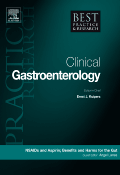
Best Practice & Research Clinical Gastroenterology
Empowering Clinicians with High-Impact Gastroenterology ResearchBest Practice & Research Clinical Gastroenterology is a leading journal in the field of gastroenterology, published by Elsevier Science Ltd, that aims to disseminate high-quality research and evidence-based guidelines for clinical practice. With an impressive impact factor and ranked in the top tier (Q1) of gastroenterology journals as per Scopus, it is recognized for its critical role in advancing knowledge and best practices in clinical settings. The journal is published biannually with content that spans a wide array of topics affecting the gastrointestinal tract, and it encourages contributions from researchers and professionals who seek to enhance their understanding and improve patient care. It's accessible in both subscription and open access formats, allowing for a broad audience engagement and dissemination of pivotal research findings. Since its inception in 1999, Best Practice & Research Clinical Gastroenterology has served as a vital resource for clinicians and academics alike, contributing significantly to improvements in gastroenterological health.
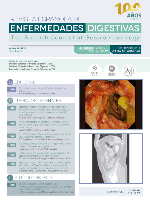
REVISTA ESPANOLA DE ENFERMEDADES DIGESTIVAS
Pioneering research for a healthier digestive future.REVISTA ESPANOLA DE ENFERMEDADES DIGESTIVAS, a pivotal Open Access journal published by ARAN EDICIONES, S A, has been at the forefront of advancing the field of gastroenterology since its inception in 1990. With a robust commitment to disseminating high-quality research, the journal provides a platform for researchers, clinicians, and students to share innovative findings and insights concerning digestive diseases. The journal is characterized by its Q3 ranking in both Gastroenterology and Miscellaneous Medicine categories, indicative of its significant contributions to these fields, and is positioned within the 36th percentile of Scopus rankings for medicine related to gastroenterology. Based in Spain, REVISTA ESPANOLA DE ENFERMEDADES DIGESTIVAS has embraced the Open Access model since 2004, ensuring that its articles are readily available to a global audience without financial barriers. The journal not only supports academic discourse but also plays a crucial role in improving clinical practices and health outcomes related to digestive health.
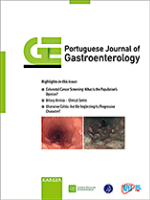
GE Portuguese Journal of Gastroenterology
Elevating Standards in Gastroenterology Research and PracticeThe GE Portuguese Journal of Gastroenterology, published by KARGER, is a prominent platform in the field of gastroenterology, providing a vital forum for the dissemination of high-quality research since its establishment. With an open access model implemented in 2012, the journal ensures that emerging findings in gastrointestinal health are readily accessible to a global audience, facilitating the exchange of critical knowledge among researchers, practitioners, and students alike. Based in Switzerland, this journal has earned a respected position within the academic community, currently holding a Q3 ranking in the gastroenterology category for 2023, alongside a Scopus rank of #113 out of 167 in its field. Spanning converged years from 2014 to 2024, the GE Portuguese Journal of Gastroenterology aims to bridge gaps in research and practice, fostering collaboration and innovation across diverse areas within the discipline. Authors and readers alike benefit from the journal's commitment to advancing knowledge and practice in gastroenterology.

Gastroenterology Research
Connecting researchers and practitioners for better health outcomes.Gastroenterology Research is a prominent scholarly journal dedicated to advancing the field of gastroenterology. Published by ELMER PRESS INC, this journal serves as a vital platform for disseminating innovative research, clinical findings, and comprehensive reviews that explore the complexities of the gastrointestinal system. With an ISSN of 1918-2805 and an E-ISSN of 1918-2813, it reaches a global audience of researchers, healthcare professionals, and students eager to contribute to or keep abreast of the latest developments in gastroenterology. Though details such as the H-index and Scopus rankings are currently unspecified, the journal's commitment to quality and impact in the medical research community is evident. Gastroenterology Research aims to foster collaboration and knowledge sharing among experts, ultimately improving patient care and outcomes within this critical area of health science. Explore the cutting-edge studies published within its pages and engage with a community passionate about the investigation and treatment of gastrointestinal diseases.

BMC GASTROENTEROLOGY
Advancing Gastrointestinal Health Through Open Access ResearchBMC Gastroenterology is a premier open-access journal published by BMC, dedicated to disseminating high-quality research in the field of gastroenterology. Established in 2001 and headquartered in the United Kingdom, this journal aims to enhance the understanding of gastrointestinal disorders through innovative research, reviews, and clinical studies. With an impressive impact factor and ranking within the Q2 category in gastroenterology and miscellaneous medicine for 2023, BMC Gastroenterology plays a critical role in advancing knowledge and practices in the field. The journal's commitment to open access ensures that researchers, professionals, and students worldwide can freely access and share vital findings and insights. Encouraging collaboration and knowledge transfer, BMC Gastroenterology is an essential resource for those dedicated to improving gastrointestinal health and outcomes.
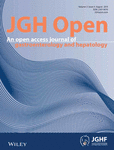
JGH Open
Pioneering Open Access in Gastroenterology and HepatologyJGH Open is a prominent open-access journal dedicated to advancing knowledge in the fields of Gastroenterology and Hepatology, published by WILEY. Since its inception in 2017, the journal has served as a crucial platform for researchers, professionals, and students to disseminate innovative research findings and clinical insights. With an impact factor and Scopus rankings reflecting its steady growth—ranking in the 3rd quartile for both Gastroenterology (Q3) and Hepatology (Q3)—JGH Open is positioned within the competitive landscape of medicine. Its commitment to open access enhances the visibility and accessibility of high-quality research, ensuring that significant advancements in understanding diseases of the gastrointestinal tract and liver reach a broad audience. With a focus on collaboration and dissemination of knowledge, JGH Open aims to contribute to the global discourse and improve outcomes in gastrointestinal health.
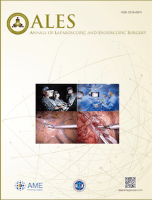
Annals of Laparoscopic and Endoscopic Surgery
Exploring the future of surgery with cutting-edge insights.Annals of Laparoscopic and Endoscopic Surgery, published by AME Publishing Company, serves as a pivotal platform for advancing the field of surgical techniques and technologies. Established in 2019, this journal emphasizes research contributions that enhance the practice of laparoscopic and endoscopic surgery, fostering innovation and clinical excellence. With an Impact Factor that reflects its growing influence in the discipline, the journal holds a respectable Q3 ranking in the Surgery category and is ranked #307 out of 551 in the Scopus Medicine_Surgery sector, placing it in the 44th percentile. This is indicative of its commitment to precise, cutting-edge research and the global relevance of its content. Researchers, clinicians, and students alike will find invaluable insights and a wealth of knowledge within its pages, as it provides open access to a diverse range of articles aimed at improving patient outcomes and surgical methodologies. The journal is based in Shatin, Hong Kong, China, and continues to push the boundaries of surgical research through its dedicated publication efforts.

International Journal of Gastrointestinal Intervention
Fostering Collaboration for Enhanced Patient CareInternational Journal of Gastrointestinal Intervention is a distinguished open-access journal published by the SOC GASTROINTESTINAL INTERVENTION that has been committed to disseminating critical research since its inception in 2012. Based in the Netherlands, this journal focuses on the dynamic fields of gastroenterology, hepatology, oncology, and radiology, offering a platform for innovative studies and clinical interventions that can significantly impact patient care and medical practice. With its incorporation into Scopus and ranked within the lower quartiles in various categories as of 2023, the journal acknowledges the evolving landscape of medical research and seeks to continually elevate its contributions to knowledge in these specialized areas. By embracing open access since its founding, the journal ensures that cutting-edge research findings are accessible to a global audience, fostering collaboration and knowledge sharing among researchers, professionals, and students. The journal aims to be a premier source of information and a catalyst for advancements in gastrointestinal interventions, making it an essential resource for those dedicated to improving health outcomes in these critical medical fields.